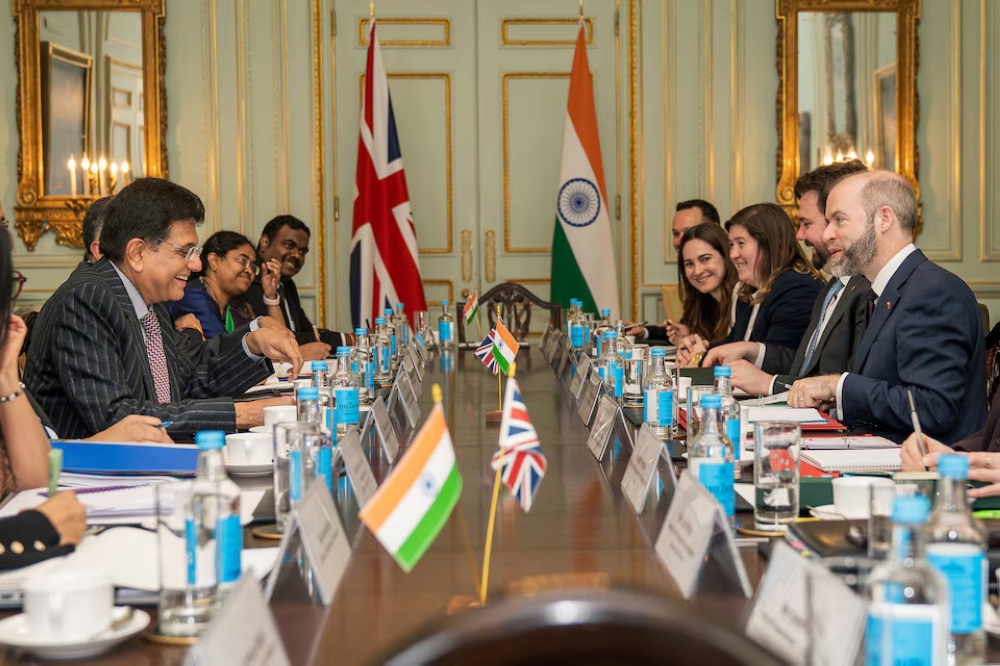

Billions of pounds in extra trade could soon be exchanged between India and the UK after the two nations signed a landmark free trade agreement, ending years of protracted negotiations.
The deal, which the UK government said was the most “economically significant” free trade agreement signed since Brexit and the “best deal India has ever agreed”, is projected to be worth as much as £25.5bn in bilateral trade, adding £4.8bn to the UK economy.
The deal will see a significant lowering of tariffs imposed by India on the UK, which the government said would “lock in” in reductions on 90 per cent of tariff lines, of which as much as 85 per cent become fully tariff-free within ten years. That would amount to India cutting tariffs worth £400m per year once the deal becomes law, and as much as £900m within a decade.
Whisky and gin tariffs will be halved from 150 per cent to 75 per cent before reducing to 40 per cent by year ten of the deal. Automotive tariffs will be slashed from over 100 per cent to 10 per cent but will remain subject to a quota. The UK would also lower the small number of tariffs it imposes on India.
India had sought lower UK tariffs on textiles, as well as better terms to facilitate visas for high-skilled jobs in the tech sector. The deal was understood to have stalled over differences on visa rules, though a breakthrough was reached after Trump’s erratic tariff regime sent shockwaves through global trade. The UK also hopes the deal could speed up trade talks on an agreement with the US.
The government said British shoppers could see cheaper prices and more choice on products including clothes, footwear, and food products — though the deal did not include certain types of food, such as dairy products and rice.
Indian Prime Minister Nerendra Modi said: “In a historic milestone, India and the UK have successfully concluded an ambitious and mutually beneficial Free Trade Agreement.” Modi added that the deal would “catalyse trade, investment, growth, job creation and innovation in both our economies.” Prime Minister Keir Starmer said: “We are now in a new era for trade and the economy. That means going further and faster to strengthen the UK’s economy, putting more money in working people’s pockets.” The UK is already a major trading partner with India, with as much as £7bn in British exports to the country in 2024, though that remains lower than India’s £10bn exports to the UK.

Ben Ramanauskas, senior research fellow in economics at Policy Exchange and a former government trade adviser, said the deal “has the potential to be very significant economically due to India’s high tariffs.
“The Government should be commended on their efforts to finally get the deal over the line. It shows that countries still recognise the benefits of free trade and so the government should continue to negotiate deals with as many countries as possible.” Stock Exchange.
The UK and India’s financial sectors are also looking to boost investment by allowing companies to list shares on both the London Stock Exchange and India’s National Stock Exchange or Bombay Stock Exchange.
The proposal set out by the India-UK Financial Partnership (IUKFP), a group of investors and policymakers from both countries, would require Indian regulators to amend existing rules. The group also called for both governments to find an agreement that would allow investors to avoid double taxation.
Standard Chartered chief executive Bill Winters, who is also the UK chair of the IUKFP, said the recommendations set out would boost investment and foster the Chancellor’s growth plans. The London Stock Exchange currently has a similar arrangement in place with the New York Stock Exchange that allows cross-listing.
Oman Observer is now on the WhatsApp channel. Click here


